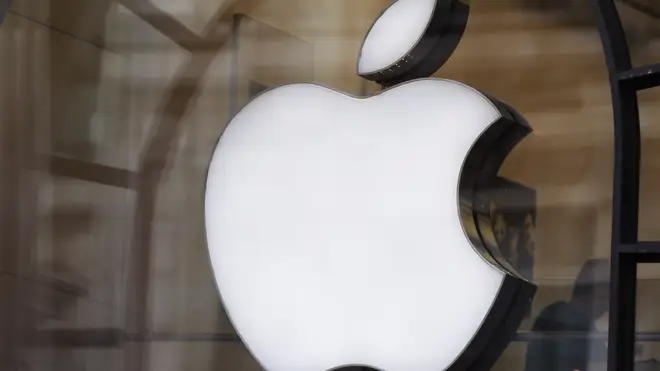
Nick Ferrari 7am - 10am
9 November 2023, 12:24

The advocate general at the Court of Justice of the European Union said a lower court’s ruling had contained ‘a series of errors in law’.
A legal expert at Europe’s top court has said a lower court committed “errors in law” when it threw out a decision by the European Commission which would force Apple to pay more than 13 billion euro in back taxes to Ireland.
The non-binding opinion is seen as a significant setback to Ireland’s defence of its past tax treatment of the US technology giant.
However, the country’s finance minister said it is still Ireland’s position that the correct amount of Irish tax was paid.
Meanwhile, Apple said it had received no state aid from Ireland and called for the decision of the lower court to be upheld.
In 2016, following an EU investigation which launched in 2014, the commission concluded that Ireland gave undue tax benefits to Apple, which would be illegal under EU state aid rules.
Ireland and Apple fought the commission on the matter and in July 2020, the General Court of the European Union annulled the decision.
However, the European Commission subsequently appealed against the decision to the European Court of Justice (CJEU) saying the lower court’s ruling was legally incorrect.
On Thursday, Giovanni Pitruzzella, an advocate general at the CJEU, agreed that the earlier ruling had contained “a series of errors in law”.
He said the judgment should be set aside and referred the case back to the General Court for a new decision.
While the opinion of the advocate general is non-binding, it is usually followed by the court and therefore could have significant implications for corporation tax bills.
The commission’s original position was that that tax rulings issued by Ireland to Apple in 1991 and 2007 substantially and artificially lowered the tax paid by the iPhone manufacturer in the country since the early 90s, in a way which did not correspond to economic reality.
As a result, competition commissioner Margrethe Vestager said Ireland had granted illegal tax benefits which enabled it to pay substantially less tax than other business over many years.

The investigation found that Apple had paid an effective corporate tax rate of 1% on its European profits in 2003, down to 0.005% in 2014, 50 euro for every one million euro of profit.
The process involved recording almost all sales profits of two Irish incorporated companies, which the commission said only existed on paper.
The companies, fully owned by Apple, held the rights to use the firm’s intellectual property to manufacture and sell its products outside North and South America.
The commission said this situation allowed Apple to avoid taxation on almost all profits generated by sales of its products in the entire EU single market.
It said this was due to Apple’s decision to record all sales in Ireland rather than in the countries where the products were sold.
The findings were disputed by the Irish State, which said all tax owed had been collected, and Apple, which had come under scrutiny in the US for its tax practices years earlier.
At the time, Apple’s chief executive, Tim Cook, branded the EU findings as “political crap”, maddening and untrue.
The Irish Government, which was also used to defending a comparatively low 12.5% corporation tax rate, said Europe had overstepped the mark in attempting to dictate tax laws and enforce retrospective taxes decades later.
Ireland and Apple fought the commission on the matter and in July 2020, the General Court of the European Union annulled the decision.
The General Court found that the commission had not shown that there was an advantage deriving from the adoption of the tax rulings.
However, the commission subsequently appealed the decision to the European Court of Justice with Ms Vestager saying the lower court’s ruling contained errors of law.

On Thursday, the advocate general agreed the General Court had erred when it ruled that the Commission had not shown to the requisite legal standard that the intellectual property licences held by the two incorporated companies and related profits, generated by the sales of Apple products outside the US, had to be attributed for tax purposes to the Irish branches.
The advocate general was of the view that the General Court also failed to assess correctly the substance and consequences of certain methodological errors that, according to the Commission decision, “vitiated the tax rulings”.
It is the non-binding opinion of Mr Pitruzzella that it is necessary for the General Court to carry out a new assessment.
The decision of the CJEU on the matter is expected next year and will have significant implications for how member states grant tax breaks to major firms.
Apple has argued it has been paying tax on the profits in question in the US, while Ireland has seen it necessary to defend its reputation on taxation issues to protect foreign direct investment.
On Thursday, Finance Minister Michael McGrath said the Government’s legal team will consider the opinion of the advocate general at Europe’s top court “in detail”.
Minister McGrath said: “I note the opinion of the advocate general. It is important to bear in mind that this opinion does not form part of the Court of Justice of the European Union judgment but is considered by the court when arriving at its final ruling.
“My department and the State’s legal team will consider the full Opinion of the Advocate General in detail.
“It has always been, and remains, Ireland’s position that that the correct amount of Irish tax was paid and that Ireland provided no State aid to Apple.
“We now await the judgment of the Court of Justice of the European Union on this matter.”
He had previously said “there was no sweetheart deal”.
Apple’s position remains that it has always paid the taxes it owes in accordance with laws in the regions where it operates.
The company maintains that Irish tax law was correctly applied on the profit generated in Ireland.
A spokeswoman for Apple said: “We thank the court for its time and ongoing consideration in this case.
“The General Court’s ruling was very clear that Apple received no selective advantage and no State aid, and we believe that should be upheld.”
In the interim, the 13.1 billion euro has been held in an escrow fund pending the outcome of the case.
The money, with interest, is due to be entered into the Irish exchequer if the commission wins the case.
However, other member states may make claims that they are owed some of the money.
If the commission loses the appeal, the large sum will be returned to Apple.